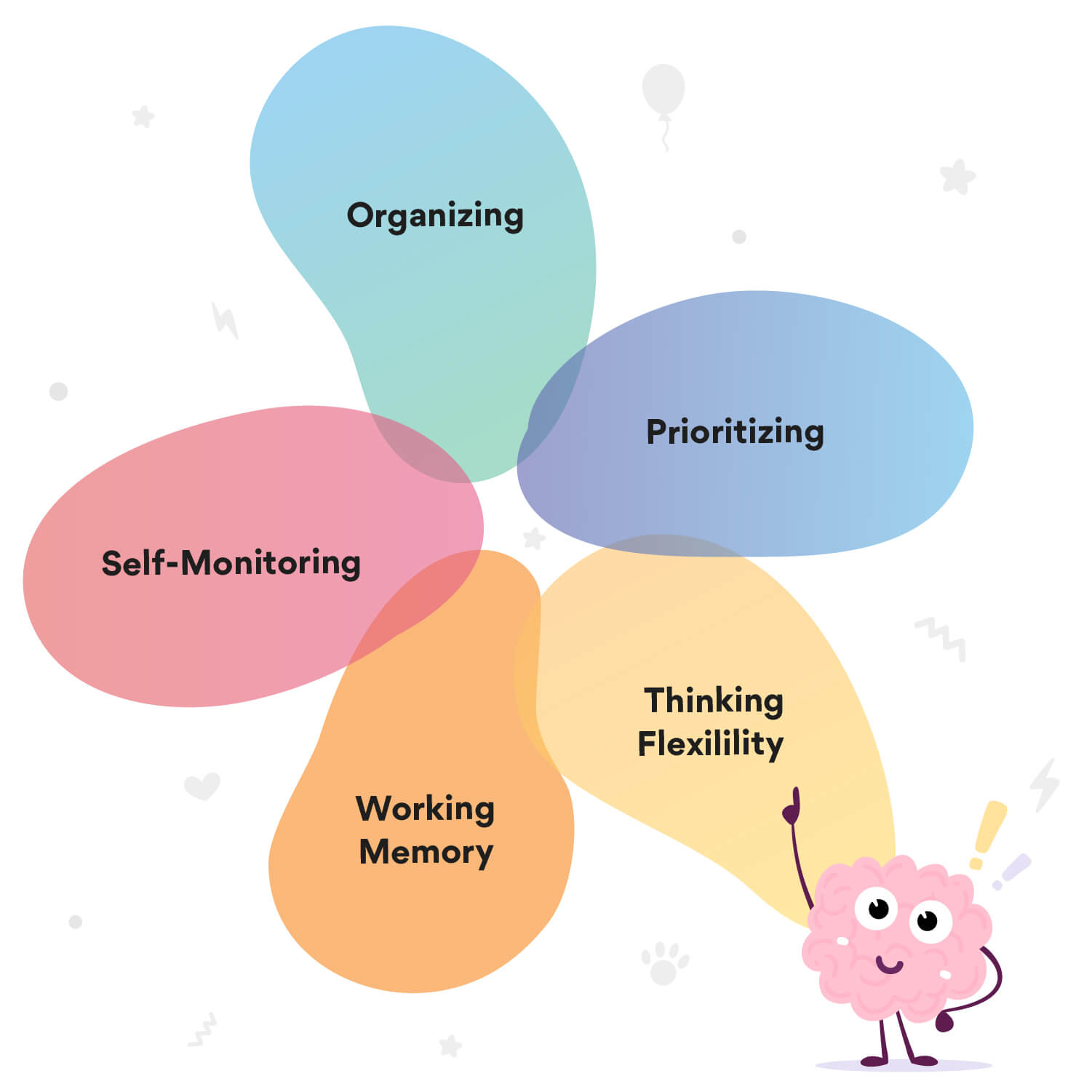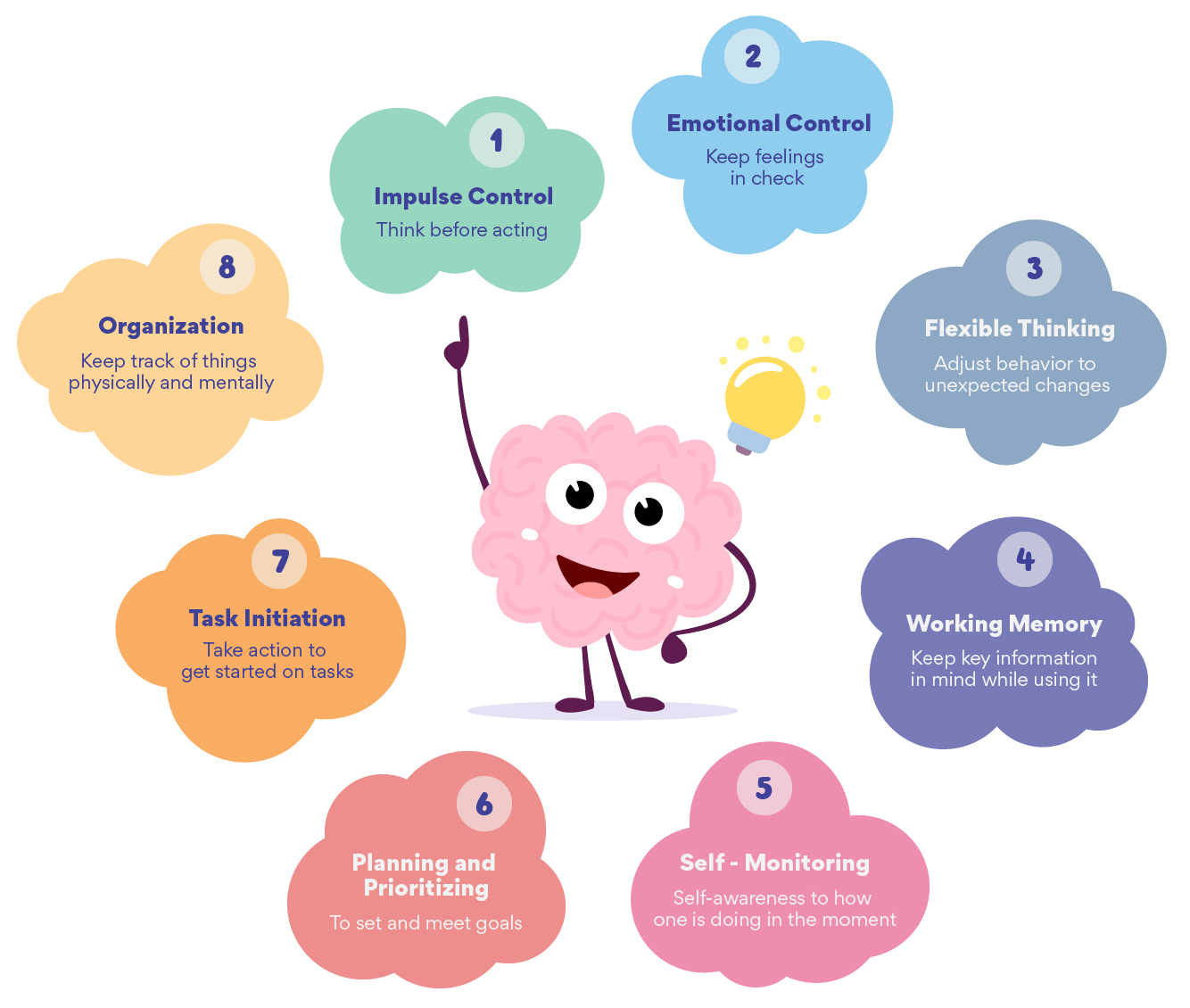Executive Function Disorder - What It Is and How to Help
We use executive functioning skills and methods every day to plan, organize, strategize, memorize, and pay attention so that we can:
- Make plans
- Keep track of time
- Finish work on time
- Multi-task
- Meaningfully include past knowledge in discussions
- Evaluate ideas and reflect on our work
- Ask for help or seek additional information
- Engage in group dynamics
- Make mid-course corrections while thinking, reading, and writing
Five Executive Functioning Areas
There are five interlinked areas of executive functioning. Your child’s academic success is heavily dependent on their ability to use these five areas correctly:

What makes executive functioning so complex is that these five areas can be broken down further for us to better understand the skills and processes that we use in our everyday lives.
In fact, executive functioning has several behavioral categories under which all these skills fall:

What is Executive Function Disorder?
Executive Function Disorder occurs when you have problems with performing executive functions. It can run in families, and issues can be seen at any age (though they tend to become more apparent as children move through the early school grades, as the demands of completing schoolwork independently can trigger the signs of the disorder).
Unfortunately, there are no quick and simple tests that can be used to identify all the different features of executive functioning, and several professionals using a variety of tests often need to get involved for your child to receive a correct diagnosis. These professionals usually include:
- Teachers
- Speech-Language Therapists
- Occupational Therapists
- Educational Psychologists
Signs and Symptoms of Executive Function Disorder
Your child may have problems with executive functioning if they have trouble:
- Planning projects
- Comprehending how much time a task will take to complete
- Telling stories due to planning and sequencing difficulties
- Memorizing and retrieving information from memory
- Initiating activities or tasks
- Generating ideas independently
- Retaining information while doing something with it
If you’d like to learn more about the signs and symptoms of executive function disorder, then you can read our article on How to Recognize Early Signs of Executive Functioning Disorder.
Executive Functioning and Speech & Language
Speech and language are skills that require a significant amount of cognitive input. Executive functioning is a core component of this cognition, and so difficulty with executive functioning can affect your child’s speech and language (and their academic performance) negatively.
Using the behavioral categories of executive functioning disorder, the adverse effects on speech and language can manifest in the following ways:

- Poor Impulse Control: Unable to stop and think before speaking, resulting in poor articulation and comments that don't always make sense
- Poor Emotional Control: Emotional outbursts due to the inability to adequately express emotions through speech and language
- Poor Planning/Prioritizing: Difficulty creating steps to reach a communication goal and make decisions about what to focus on and communicate first
- Poor Thinking Flexibility: Unable to solve communication breakdowns due to difficulty revising plans and changing strategies when conditions change, and the breakdown occurs
- Poor Working Memory: Difficulty communicating effectively, as holding the intended communication in mind while trying to relay it to a communication partner can be extremely difficult
- Poor Self-Monitoring: Unable to assess the quality of communication between partners or identify when a communication breakdown has occurred
- Poor Task Initiation: Difficulty recognizing when communication is needed and initiating that communication without being prompted
- Poor Organization: Unable to create and maintain mental systems to keep track of the information being shared via communication partners and between communication partners
Here’s How Speech Blubs Can Help
Because Speech Blubs uses the principles of Smart Screen Time, the very structure and functioning of the app target your child’s executive functioning abilities by:

- Teaching your child to organize their time, the tasks they would like to do, and the materials they require to do it
- Helping your child prioritize the tasks and materials they will need to engage with their favorite Speech Blubs activities
- Encouraging your child to become a more flexible thinker using different activities and challenges
- Continuously challenging your child’s working memory without causing them to become frustrated
- Teaching your child how to self-monitor and self-check themselves and their performance
- Our app is simple, contextually relevant and real, which means that your child can carry their newfound skills over into their everyday life
- Speech Blubs rewards your child for all their hard work, encouraging them to better themselves even further
 By Natalie Barnes
By Natalie Barnes